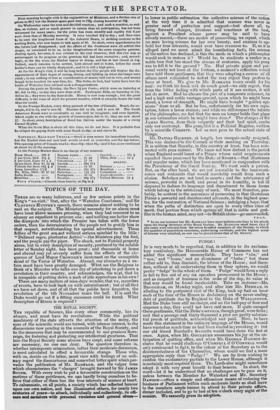THE ROYAL SOCIETY.
THE republic of Science, like every other community, has its abuses, and must have its revolutions. While the political machinery of the state attracts the attention of the many, the eyes of the scientific world are turned, with intense interest, to the discussions now pending in the councils of the Royal Society, and to the measures that may be recommended to our gracious Sove- reign, for fostering and protecting our intellectual greatness. That into the Royal Society some abuses have crept, and some reforms are necessary, no one can deny. The question therefore is, whether intemperate crimination, rather than moderate discussion, is most calculated to effect a favourable change. Those who, with us, decide on the latter, must view with feelings of no ordi- nary regret the discourteous and somewhat bitter spirit which per- vades the publication of Mr. BADHAGE, and the vulgar tone which characterizes the "charges" brought forward by Sir JAMES SOUTH. With every wish to put a favourable construction on the motives of these gentlemen, we can hardly bring ourselves to be- lieve that either of them has the true interests of science at heart. To calumniate,. on all points, a society which has reflected honour upon our own nation, and has illuminated others, for nearly two centuries of years—to attack, individually andtallectively, its offi- cers and members with personal virulence and general abuse— to lower in public estimation the collective science of the nation at the very time it is admitted that science was never in greater need of protection and support—but above all, to bring forward charges, frivolous and vexatious at the best, against a President whose power may be said to have already ceased,—these are modes of proceeding, we repeat, which no man loving science for her own beauty, and anxious to up- hold her true interests, would ever have recourse to. If, as it is alleged (and we must admit the humiliating fact), the science of the nation has declined, is this the mode in which a philosopher would seek to restore it ? Would he, to eradicate a canker in a noble tree that has stood the storms of centuries, apply his puny axe to fell it to the ground ? No. Had private pique and per-. sonal vanity not been at the bottom, a moment's reflection would have told these gentlemen, that they were adopting a course of all others most calculated to defeat the very object they profess to have at heart. We give to Mr. BABBAGE every credit for his zeal : we think his book will do much good—we only regret, that from the bitter feeling with which parts of it are written, it will not do more. Had he chosen the part of, a temperate reformer, he had a high and noble vantage-ground, upon which he might have stood, a tower of strength. He might have bought "golden opi- nions" from us all. But he has, unfortunately for his own repu- tation, taken a lower station • and while we still respect the talents of the philosopher, we feel that the man no longer holds that place- in our estimation which he might have. done.* The charges of Sir JAMES SOUTH, from their vulgarity and their bad spirit, excite only our contempt. His pamphlet is a Political Register, written by a scientific COBBETT. Let us now pass ,to the actual state of things. Mr. DAVIES GILBERT, at length, has unequivocally resigned. This was declared to the Council at their meeting on Thursday. It is seldom that Royalty, in this country at least, has been con- nected with pure science. We know not how distant is the period when England could boast of a Prince whose solid acquirements equalled those possessed by the Duke of SUSSEX—that illustrious and popular name, which has been mentioned in conjunction with the Presidency of the Royal Society. We want such a patron. But, on the other hand, we are not insensible to the inconveni- ences and restraints that would inevitably result from such a choice. Scholars are not bred in courts ; and the aristocracy of science, powerful in itself, and proud in its humility, is but ill disposed to fashion its language and deportment to those forms which belong to the aristocracy of rank. We must therefore, pro- bably, be content in the assurance of possessing in that illustrious Prince a powerful and disinterested advocate, in the highest quar- ter, for the restoration of National Science ; indulging a hope, that when the paths of distinction are open to every other class of '• • merit, that portion from which springs-all that is noble and god- 5 like in the huntan mind, may nbt-iirNitaiii alone—go unrewarded.
* In no one instance has Mr. BARRAGE been more -unfortunate than in his attack upon the Seniqr Secretary of the Royal Society. Mr. BARRAGE must know, that if any name were selected from the seven hundred members of the Society, to which. the qualities of punctilious exactness, undeviating rectitude, and the highest sense of honour were attached, no one can be placed above that of Dr. ROGET.


























 Previous page
Previous page